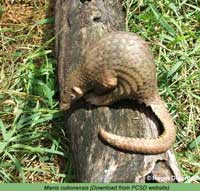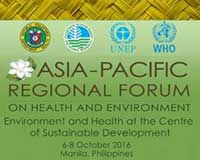ASEAN FORESTRY EXPERTS GATHER IN MANILA FOR CLIMATE CONFAB
The Department of Environment and Natural Resources (DENR) is hosting the first ever regional workshop on social forestry and its potential to climate change mitigation and adaptation in Southeast Asia on October 20-21 at Bayleaf Hotel in Manila.
The two-day workshop brings together some 50 forestry experts and policymakers from the Association of Southeast Asian Nations (ASEAN) to map out short- and long-term actions on social forestry as a major strategy to help member-countries meet their respective nationally determined contributions (NDCs) under the Paris Agreement on Climate Change.
The initiative builds on the recognition in the Paris Agreement of the important role of forests to achieve real reduction in the global emission of greenhouse gases in the short and long term.
The theme for the 1st ASEAN Forestry Working Group Workshop on Social Forestry and NDCs is "Operationalizing the Paris Agreement towards Developing ASEAN Guidelines to Strengthen Social Forestry Integration in NDCs Planning in ASEAN."
Among the speakers during the meeting are: Dr. Pham Quang Minh of the ASEAN Secretariat on “ASEAN Vision on Food, Agriculture and Forests – Perspectives on Linking Social Forestry and Climate Change”; Dr. Maria Brockhaus of Center for International Forestry Research on “Framework on Forestry and Climate Change”; Dr. Doris Capistrano of ASEAN Social Forestry Network on “Gains and Good Practice of Social Forestry and Contribution of Social Forestry and Climate Change Agenda.
Director Ricardo Calderon, chief of the Forest Management Bureau of DENR will speak on the “National Perspective of Linking Social Forestry and Climate Change”.
The Philippines, through the DENR, is currently the chair of the ASEAN Working Group on Social Forestry.
The workshop aims to further strengthen the contributions of social forestry to regional climate change plans and the NDCs of respective ASEAN nations.
According to the Center for People and Forests of the Regional Community Forestry Training Center for Asia and the Pacific or RECOFTC, forest areas placed under social forestry schemes in the ASEAN only cover 15 million hectares or roughly 3.5 percent of the region's total forestland area of 434 million hectares in 2013.
The center is an international non-profit organization that focuses on capacity building for community forestry in the Asia-Pacific region.
In its report, the center cited the Philippines and Vietnam as having the biggest contributions to social forestry at 26.12 percent and 25.08 percent, respectively.
Other countries cited in the report were Thailand with 2.23 percent; Cambodia, 1.8 percent; Myanmar, 0.13 percent; and Indonesia, 0.11 percent.
Social forestry as a national forestry conservation in the Philippines traces its roots in 1982 with the issuance of Letter of Instruction No. 1260, which consolidated three of the government's upland conservation initiatives (Communal Tree Farming, Forest Occupancy Management, and Family Approach to Reforestation) into one comprehensive program called Integrated Social Forestry Program (ISFP).
ISFP was designed to provide security of tenure to forest occupants through a 25-year Certificate of Stewardship Contract or Certificate of Forest Stewardship Agreement, and enhance the capability of farmer-beneficiaries to sustain the economic productivity and ecological stability of their settled lands.
In 1995, then President Fidel Ramos issued Executive Order No. 263 adopting Community-Based Forest Management (CBFM) as a national strategy to achieve sustainable forestry and social justice with social forestry scheme as a key framework to implement the program.
CBFM was premised on the principle of "people first and sustainable forestry will follow."
To date, a total of 1.6 million hectares of forestland are being managed by 1,884 people's organizations granted with 25-year CBFM agreements, which is renewable for another 25 years.
Of the total number of people's organizations benefitting from CBFM, 892 have enrolled their areas in the National Greening Program, the government's massive reforestation program that doubles as an anti-poverty measure. ###
- Details
- Parent Category: News & Events
- Category: Press Releases





